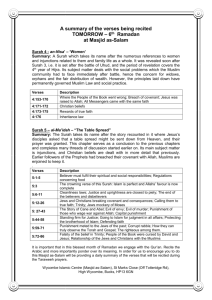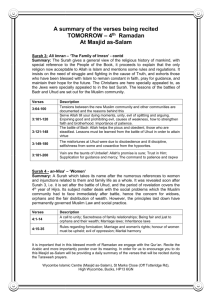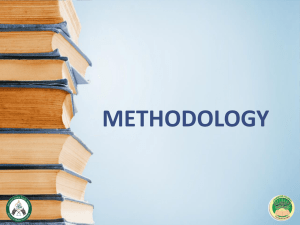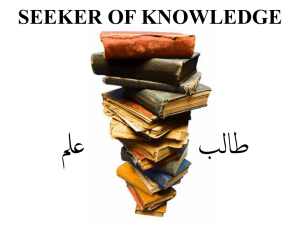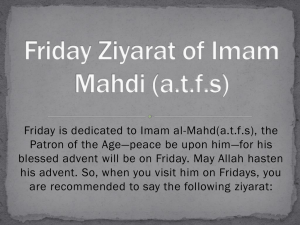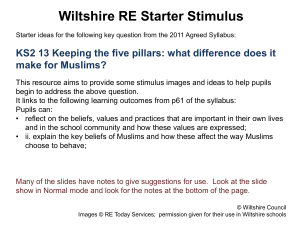Islam AS Revision Lesson 1
advertisement
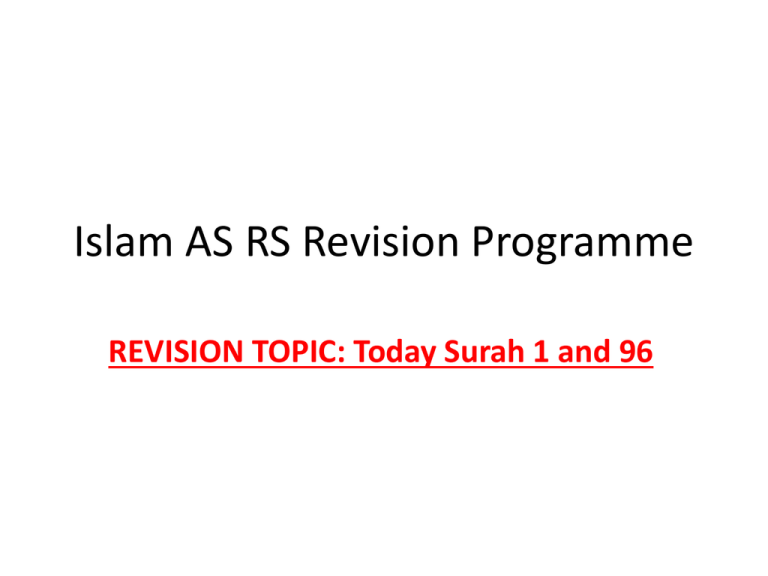
Islam AS RS Revision Programme REVISION TOPIC: Today Surah 1 and 96 Revision Lessons • What does syllabus say about this? • Revision Guide (you have copy of) • Past Papers on this topic? • Mark Scheme on the past paper? Syllabus: Surah 1 and 96 • In detail • What Surah 1 teaches about Allah and the relationship between Allah and his people • What Surah 96 teaches in relation to the revelation and knowledge of Allah • Critical evaluation What do you remember about Surah 1? Surah 1 – Al-Fatihah – The Opening What does it mean? 1. With the Name of Allah, the Merciful Benefactor, The Merciful Redeemer 2. In the name of Allah, Most Gracious, Most Merciful. 3. Praise be to Allah, the Cherisher and Sustainer of the worlds; 4. Most Gracious, Most Merciful; 5. Master of the Day of Judgment. 6. Thee do we worship, and Thine aid we seek. 7. Show us the straight way, 8. The way of those on whom Thou hast bestowed Thy Grace, those whose (portion) is not wrath, and who go not This Surah is often called the ‘Essence of the Book’ as it teaches the perfect Muslim prayer. Verses 1- 5 • These first five verses show that if Muslims pray as Allah instructed then they can have knowledge of Allah and his attributes. • They teach about the relationship between Allah and humanity and with his creation. • They explain the origins of humanity and also that the final goal for humanity is its spiritual destiny under Allah’s judgement. Verses 6 -7 • These verses are about how people should pray. • Human prayer is hardly worthy of praise to Allah. • Humanity searches for futile things and needs physical things such as food which must be requested of Allah. • The prayer sums up faith, hope and ambition and how Allah’s guidance shows people how to follow the correct way through life. Explain the implications for Muslims of the teachings in Surah 1 of Allah as Creator, Judge and Guide (25) Structure • Introduction – “Surah 1 is often called the heart of The Qur’an. It has significant implications for Muslim life” • What does Surah 1 teach about Allah? • What are the implications of this for Muslims? • Conclusion Mark Schemes (Take with pinch of salt) • Candidates might begin by quoting or paraphrasing relevant sections of Surah 1: e.g. the Cherisher and Sustainer of the Worlds; Master of the Day of Judgement, Show us the straight way. • In dealing with the implications for Muslims, candidates are expected to address the three areas but not necessarily in equal proportions. • Muslims are stewards of the created world; being mindful of Akhirah or Life After Death and depending on Allah every moment to guide Muslims to and in the straight way might be included in the response. • Candidates might note that the words relating to grace in Surah 1 are related to Allah but wrath is impersonal. Those who go astray bring wrath on themselves. • Some candidates might interpret the question as referring to Allah as the Lord of past, present and future and respond equally effectively. Surah 1 is more concerned with religious beliefs than practices • Candidates are likely to consider the topics in Surah 1 and try to decide where they think the balance of the concern lies in this set text. • The focus of Islam and of the Qur’an is Allah and the religious ideas of Surah 1 include beliefs about Allah, which the candidates explained in the first part of the question, but the whole plea of the Opening is that the believers will be shown the straight way. • Some candidates might point out that Surah 1 does not contain the Five Pillars which are key religious practices in Islam. • Some candidates might try to set the discussion within the larger context of the relationship of faith and works in Islam. THE OTHER QUESTION Explain the beliefs about Allah expressed in the shahadah and in Surah 1. [25] ‘Surah 1 contains all that is needed to be a Muslim.’ Discuss. [10] Surah 96 – Al ‘Alaq – The Clot (Blood clots) What do you remember? 1. 2. 3. 4. 5. 6. 7. 8. 9. 10. 11. 12. 13. 14. 15. 16. 17. 18. 19. Proclaim! (or read!) in the name of thy Lord and Cherisher, Who created— Created man, out of a (mere) clot of congealed blood: Proclaim! And thy Lord is Most Bountiful— He Who taught (the use of) the pen— Taught man that which he knew not. (Surah 96:1–5) Day, but man doth transgress all bounds, In that he looketh upon himself as self-sufficient. Verily, to thy Lord is the return (of all). Seest thou one who forbids— A votary when he (turns) to pray? Seest thou if he is on (the road of) Guidance?— Or enjoins Righteousness? Seest thou if he denies (Truth) and turns away? Knoweth he not that Allah doth see? Let him beware! If he desist not, We will drag him by the forelock— A lying, sinful forelock! Then, let him call (for help) to his council (of comrades): We will call on the angels of punishment (to deal with him)! Day, heed him not: But bow down in adoration, and bring thyself the closer (to Allah)! (Surah 96:7-19) Explanation • Verses 1–5: The opening of this Surah is the first revelation which Muhammad (pbuh) received from Jibril. Muslims believe that, following these verses, there was a break of up to a year before the revelations continued with Surah 68. Verses 1–5 instruct Muhammad (pbuh) to preach • Verses 6–19: The next section of the Surah, verses 6–19, explains that the main obstacles in preaching the word of Allah is human vanity, obstinacy and insolence: Explain the teachings of Surah 96 (25) Surah 96 would make a good introduction to the study of Islam (10) Mark Schemes Part A • Candidates might begin by identifying the first five verses of Surah 96 as the initial command from Jibrail to Muhammad to ‘proclaim in the name of thy Lord Some story telling of the incident in the cave on Mount Nur is inevitable and worth some credit. • Candidates who focus on the importance of the teachings for Muslims might also use the opportunity to that from the very start the message revealed to Muhammad centres on Allah the Creator, which is the very heart of Islam, the monotheistic belief in the one compassionate creator God. • Some candidates, having studied the compilation of the Qur’an, are likely to be aware that there was an interval or a break (fatra) before the next verses were revealed; but this is not essential for full marks. Candidates might explain that the importance for Muslims is the continuation of the theme- that the main obstacle to the delivery of the message is human waywardness in turning away from the path and in misleading others. • Some responses might explain the importance in terms of revelation and demonstrate sensitivity to the Muslim respect for the teachings as the words of Allah. Candidates might explain that the importance for Muslims is not simply the theological content of the message but the challenge to respond in submission and adoration. Part B • Candidates are likely to develop points made in the first part of the question and might point out that verses one to five are thought to refer to the incident in Cave Hira at the start of the revelation of the Qur’an to Muhammad . • Some candidates might use the contents of Surah 96 to discuss how far it is a synopsis of the message of the Qur’an. Others might consider the purpose of the study and whether the students are Muslim or not before concluding about the extent to which Surah 96 is a good introduction to Islamic belief and practice. • Candidates are free to choose any appropriate arena for the debate. For example, some might argue in favour of Al-Fatihah –Surah 1, which is a set text, as ‘a good’ - in fact, ‘better’ - introduction on the grounds that the compilers were inspired to use it as ‘the opening’. Plenary Key Points
